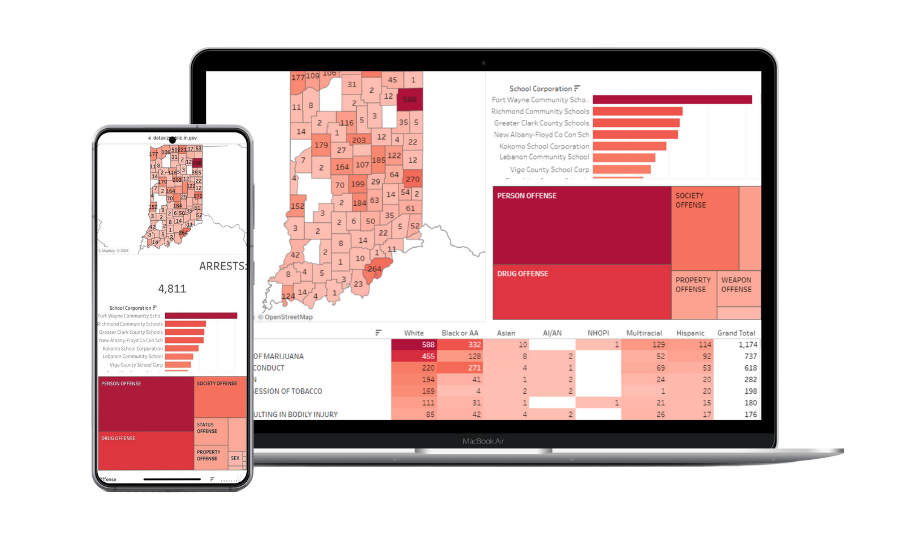Nationwide, research shows that minority youth are disproportionately involved with the juvenile justice system. To reduce the overrepresentation, ICJI carries out strategies and administers funding to address juvenile delinquency and support improvements to the juvenile justice system. The funding also helps Indiana address the four core requirements of the Juvenile Justice and Delinquency Prevention Act – one of those being Racial and Ethnic Disparities (RED).
What are racial and ethnic disparities (RED)?
Racial and ethnic disparities exist if a specific minority group’s rate of contact at a particular point in the juvenile justice system is different than the rate of contact for non-Hispanic whites or other minority groups. The different racial and ethnic groups are: American Indian or Alaska Native, Asian, Black or African American, Hawaiian or Other Pacific Islanders, Hispanic or Latino (of any race), Mixed or Other, and White. Decision point/Contact refers to the different decision points along the juvenile justice system continuum: arrests, delinquent findings, diversion, petition filed, probation, referrals, secure confinement, secure detention, and waived to adult court.
Juvenile Detention Alternatives Initiative
JDAI is a national juvenile justice improvement initiative developed by the Annie E. Casey Foundation. The initiative has been replicated across the country, proving to be successful in minimizing detention over-crowding, reducing the need to build more expensive facilities, improving efficiencies in the juvenile justice system operations, and producing better outcomes for youth and their families. Most importantly, JDAI has achieved successful outcomes while protecting community safety.
- Past Reports
2020 Indiana Juvenile Justice Equity Plan
Now known as the Juvenile Justice Racial & Ethnic Disparities Plan, this report is Indiana's plan to address racial and ethnic disparities and ensure compliance with the Juvenile Justice and Delinquency Prevention Act for fiscal year 2020, as required by the Office of Juvenile Justice and Delinquency Prevention.
2019 Disproportionate Minority Contact Report
The Indiana Office of Court Services enacted Judicial Administrative Rule 1G in May 2016. This rule requires all 92 Indiana counties to report DMC data into a statewide repository. ICJI’s research specialist analyzes county-reported data to determine if DMC exists and, if so, at what level. Relative Rate Index (RRI) is used to calculate DMC. RRI produces a value, which is an indicator of whether or not DMC exists. The rate of contact for the minority youth divided by the rate of contact for the majority youth is the RRI value. The RRI value provides information that could indicate potential DMC contributing factors, though not necessarily a disparate treatment of minority youth within a jurisdiction.
- Statewide Data Collection Project
Statewide DMC Data Collection Project
Indiana is in compliance with the DMC core requirement. There has been increasing attention regarding the important issue of Disproportionate Minority Contact (DMC) among Indiana youth. Indiana has taken a multi-pronged approach to understand and quantify the extent of DMC.
In 2012, Phase 1 of a multi-step approach was initiated. This phase included a needs assessment to understand local issues that drive DMC as well as exploring local solutions to DMC. Focus groups and quantitative interviews with juvenile justice involved youth in three communities across the state of Indiana resulted in increased understanding of DMC among diverse communities and specific suggestions of how to mitigate DMC.
In order to best address DMC, it is vitally important to accurately quantify the extent of DMC across Indiana. As a result, Phase 2 focused on quantifying the data quality among a subsample of Indiana counties utilizing juvenile justice information systems across the state. The result of Phase 2 was a clearer picture of data quality as well as initiating steps to maintain and improve data quality measures.
Phase 3 includes an evaluation and data quality improvement project of all counties utilizing juvenile justice information systems in Indiana. This takes Indiana one step closer to providing consistent, universal DMC data for all Hoosier youth.
- Resources
Still Have Questions?
Contact ICJI's RED Coordinator Shelby Price at 317-439-6678 or email sprice1@cji.in.gov.

